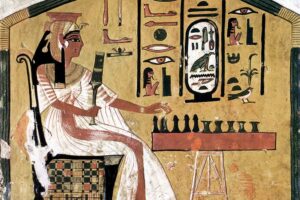Culture – Historical people
Reading time: 11 minutes
1. “The Strongest”
Alexander the Great was one of the greatest generals in human history, but at the age of 25 he had conquered a huge empire that stretched from Macedonia in the west to what is now Pakistan in the east.
Alexander celebrated his last conquests with great festivities in 323 BC. but shortly afterwards he fell ill with a terrible fever. This great commander died after a ten-day illness on June 10, but it seems likely that his death was malaria. As he lay dying, he was surrounded by his leading generals called “diadochi” and they asked him who would inherit the kingdom after him. The military commander replied, “The strongest one.”
Alexander may also have said “Hann Kraterus”, but that was the name of one of his greatest generals. The two words sound very similar in ancient Greek, and the weak king may have mumbled, but it is also possible that one of his ambitious generals deliberately misunderstood him.
Whatever the explanation, his words, as well as the ambitions of the generals, led to a 40-year civil war that split this vast empire into many parts. The person who came closest to becoming Alexander’s successor was Seleucus 1. He gained control over a large area that, among other things, stretched over the territories that are now called Iran and Iraq, and there he laid the foundation for the Seleucid kingdom.
There are many accounts of Archimedes’ life in ancient times, but the sources have one thing in common: most of them were written after the inventor’s death.
2. “Don’t Touch My Rings”
The Greek Archimedes was one of the leading mathematicians and inventors of his time. When the Romans besieged his home city of Syracuse in 212 BC, his machines were even used against the invaders.
Despite Archimedes’ invention, the Sicilians nevertheless lost their capital to the enemy. The Roman soldiers had received clear instructions to capture this well-known Greek and not to kill him at all, but Archimedes refused to follow them. The inventor was in the middle of solving a mathematical puzzle involving circles and is said to have shouted, “Don’t touch my circles”.
Eventually, one of the soldiers lost his temper and stabbed the 75-year-old man to death.
3. “Shoot, Walter, Shoot, Damn It”
William II ruled England in the years 1087-1100. His reign was marked by a lot of bloodshed, and King Vilhjálm the Red began to be called after he ordered the eyes and testicles of his uncle to be cut out after a failed coup.
The king’s tyranny came to an abrupt end on August 1, 1100, when he was hunting with the nobleman Walter Tirel. Both of them spotted a deer and Vilhjálmur shouted: “Shoot, Walter, shoot, damn it”.
The nobleman missed the hearts but unfortunately his arrow landed instead directly in the king’s chest.
The priests of the time believed that death was God’s punishment for a cruel tyrant. However, historians have doubts about this interpretation because Walter Tirel was known to be an excellent marksman and it seems unlikely that he could have aimed so wrongly.
Historians therefore prefer that it was a premeditated murder.
4. “Tomorrow, at sunrise, I will no longer be among men”
Michel de Nostredame, better known as Nostradamus, is known for his 942 cryptic prophecies. There is a lot of disagreement about their veracity, but one of the prophecies definitely came true.
On July 1, 1566, Nostradamus said to his secretary: “Tomorrow, at sunrise, I will no longer be among men”.
The next morning, the great seer was found beside his bed. Nostradamus, who was 62 years old at the time, had always suffered from rheumatism, and eventually edema in his body led to his death.
5. “May I not have lived in vain”
On the evening of October 13, 1601, the Danish astronomer Tycho Brahe, who was then 54 years old, suddenly could not urinate. The man suffered for several days, but on his last night alive, Tycho is said to have said repeatedly in delirium: “May I not have lived in vain”.
His fear turned out to be unfounded, because 26 years after his death, his disciple, Jóhannes Kepler, published the so-called “Rudolf’s Tables”, which were tables that show the positions of the planets, but the calculations are based on the observations of Tychos Brahes.
In 2010, an examination of the skeleton of Tycho Brahes proved that he had died of a urinary tract infection.
6. “That’s Life”
Ned Kelly was the son of an Irish convict and was orphaned at the age of 12. He quickly followed in his father’s footsteps and lived by robbing and rummaging in the Australian outback. Kelly was a thorn in the side of the British colonial authorities, but he was finally captured in 1880 after living as an outlaw for two years. He was then sentenced to death for the murder of a police chief.
On his way to the gallows on November 11, 1880, a reporter for the Melbourne newspaper heard Kelly say, “That’s life,” and he was probably right.
Although Kelly died as a criminal, his rebellion and exploits made him a national icon for Australians.
By the time Marie Antoinette was executed in 1793, her health had deteriorated significantly after years in captivity.
7. “Forgive me sir, this was not done on purpose.”
The French Revolution began in the summer of 1789 and three years later the newly established National Assembly decided to abolish the monarchy. King Louis XVI and Queen Marie Antoinette were arrested and charged with treason.
The queen, who was 38 years old at the time, did not fare well in detention, as she was used to belonging to the upper echelons of society. Weak, sick and gray-haired, the queen arrived in the courtroom where she was sentenced to death for promoting counter-revolution and treason. The evidence was very weak and the queen ended her life as a scapegoat.
On the morning of October 17, 1793, the queen was taken to the gallows. Despite her terrible fate, the queen maintained her dignity right up until her death. When she accidentally stepped on the executioner’s toes, she is said to have moaned the words: “Forgive me sir, this was not done on purpose”.
Shortly after, the queen was made a head shorter in the stroke deck.
More greetings from the hit deck
8. “I took one life to save hundreds of thousands”
Charlotte Corday who assassinated the revolutionary leader Jean-Paul Marat.
9. “Show the people my head.” It’s worth seeing”
Georges Danton, one of the pioneers of the revolution. He himself was to end up on the chopping block when he fell out of favor with the new revolutionary leaders.
10. “They couldn’t fit an elephant from this distance”
Confederate general John Sedgwick was a respected figure among friends and foes alike, and had a reputation for befriending his soldiers, who affectionately called him “Uncle John.”
The general was fifty when he took part in the battle at Spotsylvania Court House on May 9, 1864, and died there. He had the task of testing the field arm of the Confederate army. When Sedgwick noticed that his troops were taking cover from Confederate snipers about 900 yards away, he was filled with contempt.
Sedgwick walked across the open area and said, “Men ducking bullets? I am ashamed of you. They could not fit an elephant from this distance”.
Just a few seconds later, a submerged bullet pierced the general’s head, just below the left eye.
Sedgwick was the first Union general to die in the American Civil War.
11. “My last wish…a bulletproof vest”
James W. Rodgers was working as a security guard at a uranium mine in the state of Utah, when he shot and killed his co-worker in 1957. Rodgers defended himself at trial by claiming that he was suffering from syphilis when he committed the crime. It turned out that the two men had had a heated argument about the best way to repair a backhoe.
Rodgers was sentenced to death and chose to be shot. When he was led to the place of execution on March 30, 1960, he said bluntly: “My last wish … a bulletproof vest.”
His wish was not granted and Rodgers was the last person to be executed before the Supreme Court banned the death penalty. However, they were allowed again in 1976.
12. “I’m tired of everything”
Winston Churchill is known as the invincible Prime Minister of Great Britain, the one who filled the British with fighting spirit against the Nazis, but he won, among other things, the Nobel Prize for Literature and was nominated as an honorary citizen of the United States.
After losing the election and losing the Prime Ministership after the Second World War, this tireless politician nevertheless continued to lead the Conservative Party and was elected Prime Minister from 1951-55. After that, the political leader began to gradually withdraw from public life. Churchill’s health deteriorated rapidly, not least after he became partially paralyzed on one side after suffering a stroke.
Churchill continued to engage in politics until he reached the age of 89 in 1964, but then rarely left the house and suffered from dementia. When he suffered a fourth stroke in 1965, it was clear that he did not have long to live. He managed to moan to his family: “I’m tired of everything”. He then lost consciousness and never recovered.
13. “Parting words are for fools who haven’t said enough.”
The German philosopher and writer Karl Marx had devoted his life to presenting the ideology of communism and spreading it. Despite the multitude of published articles and writings, Marx spent the evening of his life as a destitute, sick and mentally ill old man.
When the 64-year-old philosopher was dying in 1883, with chronic bronchitis, his housekeeper asked if he wanted to say anything at the end, and Marx hissed angrily:
“Farewells are for fools who haven’t said enough.”
Interest in communism increased after Marx’s death and his ideas gained a lot of weight in the revolutionary world.
Published: 11.09.2021
Kirstine Viktoria Rattleff


















